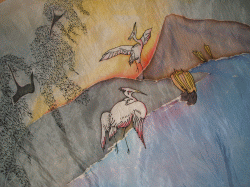The other day I received a phone call from a friend who needed a shoulder to cry on. Mine are quite big, so I seemed to be a natural choice. We talked a bit and although she was laughing in the end I was not sure if I was able to give her what she needed, and hence it kept me thinking.
I guess we all know those moments when something happens that engages us emotionally to such a high level, that the brain just shuts off and becomes mushy. Thoughts are manifold and whizzing fast, and the one thought that we think might bring relief is always only just escaping our grasp and is floating away in the stream of all the others. Usually we cry our eyes out, if we look into the mirror we don't see anything that would make us feel better, we usually take some random action in the hope to make it stop, and more often than not the action we have decided upon taking is something silly and the whole cycle is starting all over again. But worst of all: One is feeling really alone!
Whenever I was in a situation like this I felt utterly convinced that only I have ever done such a stupid, stupid thing, that those things are only happening to me because I am a magnet for that sort of misery, and that I probably deserve it.
This is the time when one is in need of a friend!
See, and this is what kept me thinking. In a moment and a mood like this: Is there a way to find out which friend to call? Is it possible to find this one marble in that mushy brain that is still in working order, to find out which of all the friends would be the most capable of providing help?
When I received this phone call I remembered how often I was frustrated after having spoken with people about my problems. I had one good friend who always said the right thing, but when she was not around I was screwed.
Detlef was sweet, but despite his big shoulders a bit helpless in cases of emotions running high. Blokes do things differently. They buy a gadget to show off to their friend, or they go to the football field and play a bit more aggressively than usual: Their status is restored and they are fine. We girls resolve our issues by talking and only very few men pull that off. Should you know such a specimen: Cherish it! They are worth gold!
And then there were people like my mother in law. Well, she was not necessarily a friend in the girly sense, but a woman, and she had experience... Well, from her I usually got full on advice... which is not working when one is overwhelmed by all sorts of body chemicals causing the brain to melt.
I however realise that I am becoming more and more like her, whereas in the early days I used to be like my best friend. What has happened? Could or should I change back? Or have I just become useless in those things?
I now think I have figured it out.
There are three possible responses to emotional turmoil:
Pity - Compassion - An outside view
... and in order to visualise which impact those three have on the distraught soul, please let us imagine that life is like going down a white-water in a raft. There are nice and lovely banks, with calm water, everything is running smoothly and life is good, and then there are rapids. They are good, they are challenges, one will have to learn how to negotiate them. Just from floating along one doesn't learn a thing, one has to get into the white of the water to learn how to manoeuvre the boat of life. Just sometimes it becomes a bit too rough, the boat is starting to twist and sometimes one goes head under. This is the moment when one could do with a bit of help!
Pity is the least thing one wants. Pity you will get from people who become easily emotional, but are not actually interested in you, but their own well being. They feel that you surely are a poor sod, but are more sorry for themselves having to look at you, making them feel all emotional. One will want to avoid those! You don't need them, they don't need you, and nothing but humiliation can come out of this. In a 'mushy brain' situation you need people who actually like you. I find it better not to talk, than talking to one of them! Pity you get from the person who flies above the river, sees you getting hit by a rock, shouts 'oh so sorry', and moves on. Should one accidentally have chosen one of them to talk to, it is important to remember that feeling worse afterwards is not ones own fault! They are just useless for the task.
Compassion on the other hand is a very, very good thing. The word has the syllable 'com' - 'together' in it. It means 'understanding, and feeling with the other person' in the literal sense. This is what I would get from my best friend. Hours on end we would sit and talk the same stuff over and over again... and the next time we met the exact same thing would be on the agenda. I am pretty sure those sessions saved our both marriages during the early days. How else would one make sense of how men behave? I had a similar relationship with my best friend at school. Whenever one of us had boyfriend trouble we used to sneak out of school and comfort each other over some hot chocolate and cake. And again it was never done in just one session. All the thoughts that whizzed round our heads, needed to be disentangled and discarded one by one.
A compassionate friend is one who is in a similar life situation like you, has similar amounts of time available, similar background and is able to respond to any of your rants with: 'I know! I had exactly the same... how can they?... and is yours like this and that? See! unbelievable...' A compassionate friend is somebody who basically is sitting in the same boat and floating down the same river, encountering the same rapids to then join you in a hurray when reaching a soft bank.
The one thing a compassionate friend cannot give you is an outside view. Sitting in the same boat means that this friend cannot be the one who is standing at the banks, observing the river and knowing where the cliffs are. There might have been a less threatening path, some moves or techniques to tackle a rapid in a safe way, but you could not see them because you were looking from the inside.
It is a point of view of experience which usually comes with age. The ones in the boat might hear the advice but may angrily be shouting back '... you out there, standing safely at the banks... what do you know? I am fighting for my life here!' forgetting that the person standing on safe ground made it through those waters before, has been in the rapids and made it out. The person with the outside view will not be able to join the emotional chorus of the compassionate friend, she is not in the boat after all, but she knows a thing or two and she means well.
It appears that one needs both: When things are tough one needs the compassion, but too much of it might elongate the process of getting out of a situation. The voice of advice sometimes can break a vicious circle of emotional turmoil, but only if the noise of the mind has been calmed by a compassionate friend so that advice can actually be heard. This is calling for two different sets of friends, as nobody can be in the boat and standing at the river bank at the same time, and hence one needs to find that one sane thought which determines which type of friend is called for in a particular situation.
In order to manage a crisis and to avoid disappointment it might be an idea to classify ones friends while the waters are still calm: avoid the pitiful, use the compassionate and once in a while listen to the ones who have been there.
And as for myself?
It appears that for many of my friends I have reached the stage of 'outside view'. I have gone past men trouble, education, and rebelling against parents. I guess the answers to my questions from the beginning are: No! I am not altogether useless in these things. Although I feel sorry that on occasion I might not be the right partner for a compassionate chat, I never feel pity. I feel that I am exactly the right place.


















